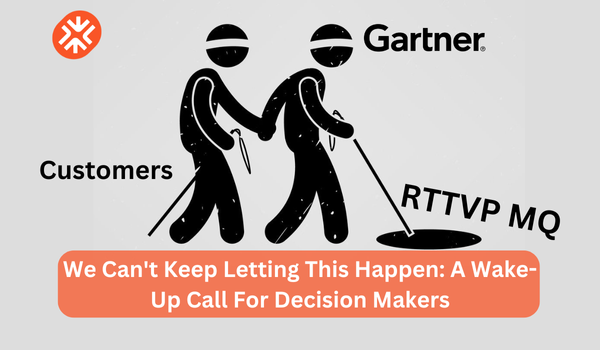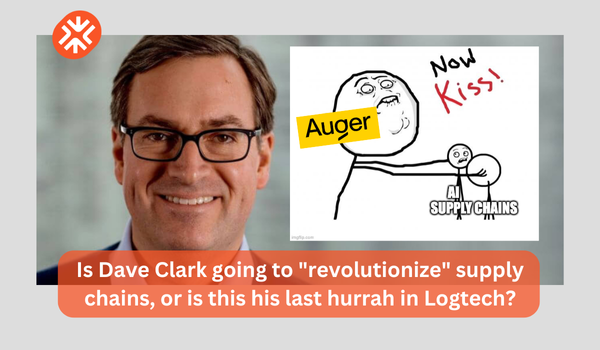Logistics Technology has an addiction problem.

Logistics technology is broken.
Not all logistics technology is bad or dysfunctional. There are some great solutions out there today that directly solve real problems faced by logistics service providers and cargo owners alike. What I'm getting at here is a different kind of broken. Everything surrounding logistics technology feels… dirty. From the marketing trickery to the “magic” quadrants, not forgetting the snake-oil merchants with a buzzword for each and every ailment. Logistics technology is an addict.
And its time for an intervention.
We love a good buzzword.
There is no escaping this, humans love a buzzword. I've often fallen victim to hype cycles myself, the collective anticipation and flashy marketing combined with a generous dousing of buzzwords, really is a powerful combo. This isn't just a logistics technology thing. Look at Nvidia, Tesla, Blackberry, the Windows phone, Zune, Taylor Swift's latest album. Before any real evaluation or review is even possible, marketeers are busy at work, creating buzzword-filled ads, AI-generated videos, and using the latest Canva templates to assault our senses. And it works, most of the time (RIP the Windows Phone).
Logistics Technology is no exception. I did find it easier to sort the noise from the real solutions in the 2010s, but this decade is insane. We can't put all the blame on the buzzword enabling media, marketeers, and consultants though. If they continue to behave this way, surely it is because the strategy is working, right?
In the past few years alone we've bounced from Blockchain to RTTVP to Control Tower to Supply Chain Digital Twin, and now, to AI (notice how those last 3 are all SAP links...). I've spent hours combing through articles and press releases from the usual suspects, finding very few real success stories that come across as genuine. If any of these solutions were truly innovative and groundbreaking, we would be seeing the democratization of their presence across global supply chains by now. The usual problems we have, ranging from congestion to visibility and everything in between would be distant memories. The heavily-funded decade-old "start-ups" would have made their people rich, like what we've seen happen with Nvidia.
Instead the Buzzword Conga line continues its merry dance, with tech customers growing more and more fed up with situation as time passes, and those who give these founders and their ideas years of their lives, see little to no exit in sight, and are left holding the bag after becoming victim of another RIF.
Who are the buzzword enablers?
There are three groups enabling this pervasive practice in logistics technology. The first being the potential customers themselves by signing-up for the latest unproven fad, mainly out of desperation with mounting supply chain issues and no positive outcomes in sight.
The second being some of the consultants this industry is plagued with (not all of them, thankfully!), happy to upsell customers to kingdom come and then drop the blame on those same customers when the project scope and budget has blown-up, along with the project.
And last but not least, we have the paid media and influencer network happily taking big payouts to promote buzzword filled ideas, regardless of their reputation or legitimacy. We read them on LinkedIn, we listen to them on podcasts, and we see them at all the industry events. We know who they are. They know who they are. And yet they continue to lead the buzzword conga line, costing supply chain and logistics decision makers millions with their undisclosed promotional content and poorly disguised endorsements. This is not something unique to logistics and supply chain, it has been a longstanding problem across social media, with platforms starting to impose strict policies requiring systematic disclosure.

Logistics Software bloat is killing the market
Have you seen one of those Logistics Technology or “FreightTech” maps recently that do the rounds on LinkedIn? I spend a fair amount of time studying the market and even I'd be lucky if 25% of the names on any given list ring a bell. We've cycled through digital forwarding “Flexport” copycats to “real-time visibility” providers, and now we seem to be in a cycle focused on all things “AI” and “customs”. The former makes me laugh, the latter has me greatly concerned.
Usually behaving like roaches in the dark of night, creeping around for scraps, when the cycle hits their vertical, these companies are emboldened and come out in droves. The best recent example of this behavior was after C.H. Robinson announced their “AI” solution to extract data from emails, leveraging OCR tech and workflows to “automate” booking creation. Nothing truly innovative or novel, but the market loved it, social media was whipped into a frenzy, mainstream industry media posted dozens of articles on the topic, and the roaches burst onto the scene.
Dozens of logistics tech companies had their sales reps and founders alike spamming LinkedIn comments about the ways they deliver the same outcomes. It was amazing to read, especially with the liberal use of “AI” and no mention of “OCR” or the manual review requirements usually done by a small army of people out of South East Asia or South America. What a joke.

How is a shipper or LSP supposed to find a real solution through all this noise? They'll turn to the legitimate and trusted sources of course. But who are they really?
Who can you trust for information?
There are some great mainstream industry media options out there who label all sponsored content and try to remain as unbiased as possible. I've never hidden my appreciation for Eric Johnson and the JOC, and would like to add a growing appreciation for Alex and Alessandro at The Loadstar. Others however have usually provided content that at best is cringe-inducing, and at worst is outright paid marketing. The latter wouldn't be an issue if it were systematically disclosed, but this is logistics and supply chain, who cares about the rules, right?
And then you have Gartner. The only thing magical about a Gartner Magic Quadrant is that companies continue to spend hundreds of thousands with Gartner, in the hope that they will remain a leader in the quadrant. How on Earth did project44 maintain leader status in 2024 in the RTTVP MQ after laying-off what must have been half of the company, closing down offices, having no successful product launch, and dropping to what must be at most 30% of their all time high valuation? Oh, and their latest announcement about deeper investment in China? That's interesting, as the impression previously given was that they'd let go of their Chinese staff. This behavior is repeated across different MQs, and is reason enough to not include Gartner in your decision making processes.
You may as well save yourself some money and use ChatGPT instead.

$19.99 per month for the same result, how about that?
Of course I joke, there is a lot of work that goes into Gartner reports. But do the results of that work reflect reality, or are they biased and skewed results due to money exchanging hands, unfit processes, and unadapted criteria that does not fit today's rapidly evolving tech landscape?
Finally, we have the influencer-sphere. Who are they? Well, I've been labelled as an “influencer”. Frankly, I've been called worse. The problem here is the lack of transparency and disclosure. Would you feel the same way about an article or a podcast if you found out the company it is talking positively about paid between $10k and $200k for the privilege?
This isn't about throwing shade onto others, this is about the need for our industry to change, and that change starts with the people who attempt to influence the way you think.
So what's going on with AI right now?
You've all been exposed to the ChatGPT 4O vs Claude 3.5 debate, the Gemini vs Llama standoff, and so on, as well as Nvidia's conquering of the US stock market. But how does all this impact logistics technology?
Well so far, not much.
Some interesting things have happened for sure. The usual suspects such as SAP have jumped on the AI bandwagon, and with good reason: each new buzzword is an opportunity for them to rename, rebrand, or repurpose something and flog it with a higher markup. WiseTech Global's CEO Richard White seems to have changed his stance on AI in recent times, which probably means that they've found a highly lucrative use case that they can include in CargoWise or any new product and create a new revenue stream. We've seen Overhaul attempt RiskGPT, I'm still on the fence about that one. On the one hand, it is just a glorified chatbot, but enhanced with the Vision AI module and done right, my previous prediction of Overhaul becoming the first 100% AI company doesn't seem that farfetched anymore. How valuable would that make them? I know right, exciting.
And then you have everything else.
Early days, there was a proliferation of AI chatbots, the most recent high profile one being RateGPT by Freightify. Because that is what everyone wants: another screen to open, another billable service, and another solution that is not integrated with your quoting and booking tools. How tiresome to see that we're still skipping the foundational elements that make good logistics tech great, in favor of quick and nasty buzzword pleasers.

We mentioned the C.H. Robinson play earlier, with a number of OCR solutions coming out of the woodwork chanting “AI, AI, AI” in a cacophony resembling the seagulls in Finding Nemo. The Gartner event in Barcelona seemed to be invaded by AI solutions, with catchy terminology such as “AI-First”, “AI-Powered”, and “AI/ML Enhanced” omnipresent.
At this rate it could be Blockchain all over again, with customers falling out of love with AI solutions before a good one is even released. So much lost potential, can we stop repeating this idiotic mistakes and actually bring some dignity back to logistics tech?
It's all fun and games until you mention “compliance”
A new favorite game of mine: whenever someone asks me to check out their “innovative logistics technology” solution, I like to ask them about compliance. Eyes go blank, mumbling ensues, and any potential interest gradually slips away on my end. In supply chains, compliance is anything but a joke. Recent rulings have caused havoc in the detention and demurrage world. I also expect the US customs space to change greatly with third-party data entry by foreign entities outright banned. This is why all these “AI Customs” plays concern me.
During my time at WiseTech Global, which seems like a lifetime ago, we starting laying the foundation of a global customs solution. The goal was simple: acquire the best customs compliant software solution in each target market, with the best people, and build the solution natively into CargoWise. This project allowed me to learn a thing or two about customs and compliance, amongst other things.

So when I see some of these “AI customs” solutions in the market today, I worry about the enshittification of the space, eventually leading to a number of negative outcomes.
- The majority of these AI customs solutions use OCR to automate customs data entry - as mentioned previously, this is likely to be prohibited by the US, and I wouldn't be surprised if the EU follows suit
- These OCR solutions require manual review with some being lower than 70% accurate - even at higher accuracy levels, the stakes are too high to completely automate today
- When something goes wrong because of these low-quality solutions, the software provider will not be liable
- A customs mistake can be extremely costly as you all well know
There are some interesting use cases for AI in customs, but this new “OCR” rush, is nothing more than a rehashing of an ageing practice that is overpromising and underdelivering. Unless an AI Customs OCR solution recommends you use your own people in-country for manual review, I'd give them a hard pass.
Another rather negative outcome of the enshittification is the increased staying-power of the legacy platforms. WiseTech's customs solution has the widest scope and scale, and with these new “AI-first” players peddling dodgy solutions to the market, they will eventually turn to the more expensive and reputable vendor, reducing innovation. We need more innovation, not less.
Change takes time, but I'm optimistic.
Although the past few years haven't been great for logistics technology with very little true innovation or change, I remain optimistic for the future. We're seeing tech fatigue across the board from both BCOs and LSPs now, which is going to force the tech companies to up their game. Compliance is becoming stricter, again pushing tech companies to up their game or risk costly law suits.
On the marketing and paid media front, I've had the pleasure of speaking with a number of LSPs and BCOs who have turned to paid media and marketing outlets with very little success. Spending for the sake of spending is fast going out of fashion. Furthermore, the dodgier mainstream media players have taken a hit to their reputation, and the legitimacy of Gartner is being questioned by many.
I'd like to believe that fatigue is also finding its way into the paid marketing and influencer game in our industry, and that it too, alongside logistics tech, is in for quite some change. And yes, I'm wishing for the very thing that will likely reduce my viewership and reach, what kind of an idiot does that? Hopefully this and the growing education and knowledge of stakeholders across supply chains, will be enough to disrupt the Buzzword Conga line once and for all.
Want more? Click the image below to access my LinkedIn profile and send me a connection request or follow for more content.

We're now at over 9,300 followers on LinkedIn and over 600 on the newsletter. Thank you for your support, it goes a long way and keeps me motivated to keep creating content that I hope provokes conversations, changes minds, and gets you thinking.
See you on August 13th for the next one, followed by a special edition WiseTech results newsletter on the 22nd or 23rd of August, depending on how big the announcements and results are (or are not!).





